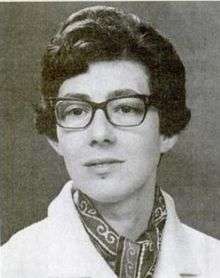Daphne Jackson
| Daphne Jackson | |
|---|---|
 | |
| Born |
23 September 1936 Peterborough |
| Died |
8 February 1991 (aged 54) Guildford |
| Nationality | British |
| Website | daphnejackson.org |
Daphne Frances Jackson (23 September 1936 – 8 February 1991) was a nuclear physicist. In 1971, she became the first female physics professor in the UK. A legacy after her death in 1991 enabled the foundation of the Daphne Jackson Trust.[1]
Biography
Daphne Frances Jackson was born in Peterborough; her father was a machine tool operator and her mother had been a textile designer before she married.[2] Jackson went to the local grammar school, Peterborough County Grammar School for Girls from where she was able to apply to take physics at Imperial College in London. She was one of only two female students on the course alongside 88 males.[3]
Jackson moved to what is now called the University of Surrey at the invitation of Lewis Elton to study nuclear physics when he became head of the physics department at Battersea College of Advanced Technology.[4] She became a lecturer and she was awarded a doctorate in 1962.[2]
In 1971, Jackson became Britain's first female professor of Physics when she was appointed by University of Surrey [2] at the age of 34.[3] She eventually rose to be the Dean of the university as well as sitting on a range of bodies; she held a senior position at the Meteorological Office, and was president of the Women's Engineering Society and vice-president of the Institute of Physics, after being its youngest ever fellow.[4]
Jackson campaigned for women's rights and she was disappointed to see that talented women were lost in lowly jobs because they could not re-enter their career after a break. In 1985 Jackson devised a plan to help these women by allowing them to work for two years where they could readjust to their discipline after taking a break to have a child, becoming a carer or just because they followed their husband's career rather than their own.[2] Jackson is reported as saying, "Imagine a society that would allow Marie Curie to stack shelves in a supermarket simply because she took a career break for family reasons." [5]
“Qualified women who are unemployed or under-employed following a career break for family commitments represent an appalling waste of talent and of investment in their initial education. Many such women are eager to return to their original careers or to a new field of activity for which their initial education is relevant, provided that retraining can be given and that they can, at least initially, work on a part-time basis.”
Illness and death
Ironically Jackson was diagnosed with cancer - a disease she was helping to fight through her work with the Institute for Cancer Research and the Royal Marsden Hospital. She had published 55 articles on the use of nuclear physics in medicine. She was appointed an OBE in 1987.[4] Jackson died in Guildford in 1991 of cancer.
References
- ↑ "History of the Daphne Jackson Trust". Retrieved 13 April 2015.
- 1 2 3 4 Biography of Daphne Jackson, Daphne Jackson Trust, accessed October 2012
- 1 2 First Female Physics Professor, New Scientist, 21 September 1972
- 1 2 3 R. C. Johnson, E. A. Johnson, ‘Jackson, Daphne Frances (1936–1991)’, Oxford Dictionary of National Biography, Oxford University Press, 2004 accessed 18 Oct 2012
- ↑ "Memorandum to the Parliamentary Select Committee on Innovation, Universities and Skills, Memorandum 50". 27 March 2008. Retrieved October 2012.
Professor Daphne Jackson ... summarised the issue of women returners most succinctly by saying "Imagine a society that would allow Marie Curie to stack shelves in a supermarket simply because she took a career break for family reasons".
Check date values in:|access-date=(help)